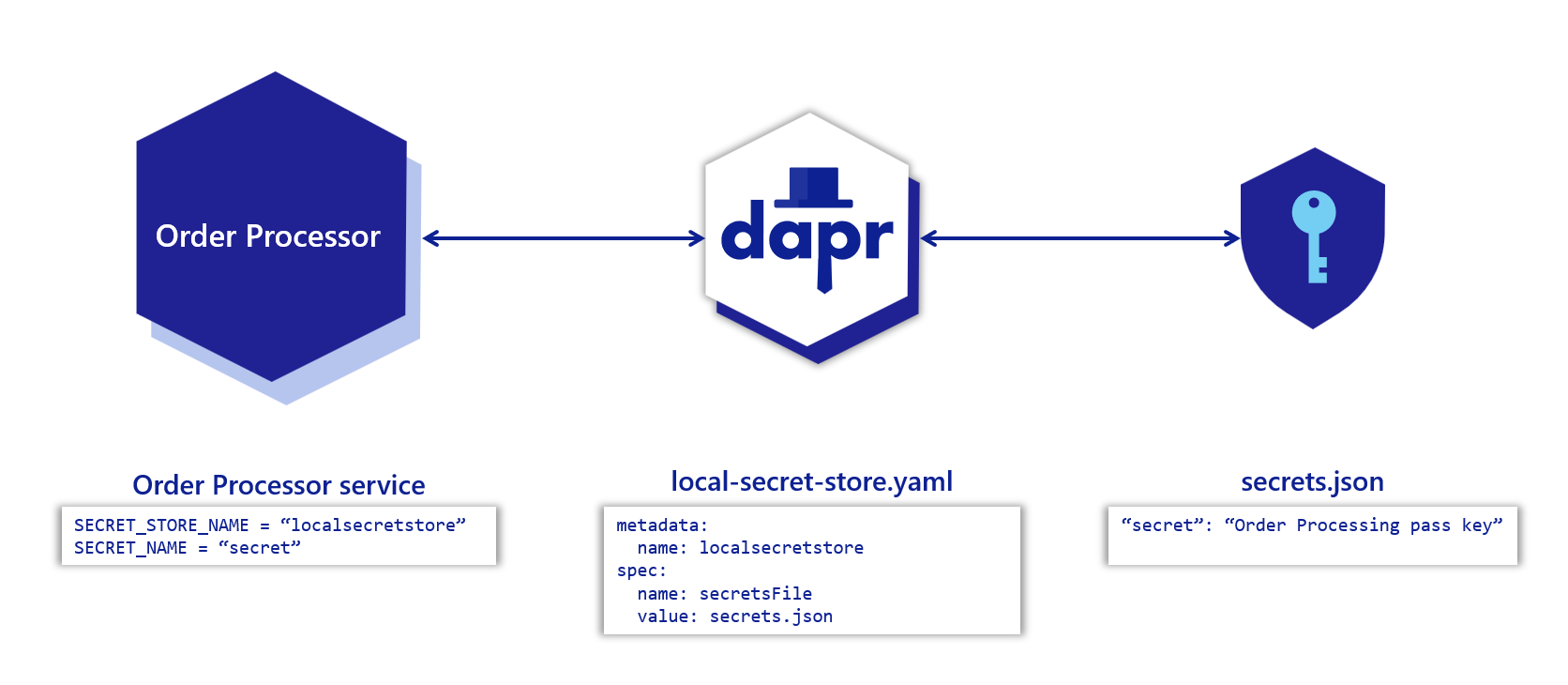The documentation you are viewing is for Dapr v1.8 which is an older version of Dapr. For up-to-date documentation, see the latest version.
How To: Retrieve a secret
Now that you’ve learned what the Dapr secrets building block provides, learn how it can work in your service. This guide demonstrates how to call the secrets API and retrieve secrets in your application code from a configured secret store.

Note
If you haven’t already, try out the secrets management quickstart for a quick walk-through on how to use the secrets API.Set up a secret store
Before retrieving secrets in your application’s code, you must configure a secret store component. This example configures a secret store that uses a local JSON file to store secrets.
Warning
In a production-grade application, local secret stores are not recommended. Find alternatives to securely manage your secrets.In your project directory, create a file named secrets.json with the following contents:
{
"secret": "Order Processing pass key"
}
Create a new directory named components. Navigate into that directory and create a component file named local-secret-store.yaml with the following contents:
apiVersion: dapr.io/v1alpha1
kind: Component
metadata:
name: localsecretstore
spec:
type: secretstores.local.file
version: v1
metadata:
- name: secretsFile
value: secrets.json #path to secrets file
- name: nestedSeparator
value: ":"
Warning
The path to the secret store JSON is relative to where you calldapr run.
For more information:
- See how to configure a different kind of secret store.
- Review supported secret stores to see specific details required for different secret store solutions.
Get a secret
Get the secret by calling the Dapr sidecar using the secrets API:
curl http://localhost:3601/v1.0/secrets/localsecretstore/secret
See a full API reference.
Calling the secrets API from your code
Now that you’ve set up the local secret store, call Dapr to get the secrets from your application code. Below are code examples that leverage Dapr SDKs for retrieving a secret.
//dependencies
using System;
using System.Collections.Generic;
using System.Net.Http;
using System.Net.Http.Headers;
using System.Threading.Tasks;
using Dapr.Client;
using Microsoft.AspNetCore.Mvc;
using System.Threading;
using System.Text.Json;
//code
namespace EventService
{
class Program
{
static async Task Main(string[] args)
{
string SECRET_STORE_NAME = "localsecretstore";
using var client = new DaprClientBuilder().Build();
//Using Dapr SDK to get a secret
var secret = await client.GetSecretAsync(SECRET_STORE_NAME, "secret");
Console.WriteLine($"Result: {string.Join(", ", secret)}");
}
}
}
//dependencies
import com.fasterxml.jackson.core.JsonProcessingException;
import com.fasterxml.jackson.databind.ObjectMapper;
import io.dapr.client.DaprClient;
import io.dapr.client.DaprClientBuilder;
import org.springframework.boot.autoconfigure.SpringBootApplication;
import org.slf4j.Logger;
import org.slf4j.LoggerFactory;
import java.util.Map;
//code
@SpringBootApplication
public class OrderProcessingServiceApplication {
private static final Logger log = LoggerFactory.getLogger(OrderProcessingServiceApplication.class);
private static final ObjectMapper JSON_SERIALIZER = new ObjectMapper();
private static final String SECRET_STORE_NAME = "localsecretstore";
public static void main(String[] args) throws InterruptedException, JsonProcessingException {
DaprClient client = new DaprClientBuilder().build();
//Using Dapr SDK to get a secret
Map<String, String> secret = client.getSecret(SECRET_STORE_NAME, "secret").block();
log.info("Result: " + JSON_SERIALIZER.writeValueAsString(secret));
}
}
#dependencies
import random
from time import sleep
import requests
import logging
from dapr.clients import DaprClient
from dapr.clients.grpc._state import StateItem
from dapr.clients.grpc._request import TransactionalStateOperation, TransactionOperationType
#code
logging.basicConfig(level = logging.INFO)
DAPR_STORE_NAME = "localsecretstore"
key = 'secret'
with DaprClient() as client:
#Using Dapr SDK to get a secret
secret = client.get_secret(store_name=DAPR_STORE_NAME, key=key)
logging.info('Result: ')
logging.info(secret.secret)
#Using Dapr SDK to get bulk secrets
secret = client.get_bulk_secret(store_name=DAPR_STORE_NAME)
logging.info('Result for bulk secret: ')
logging.info(sorted(secret.secrets.items()))
//dependencies
import (
"context"
"log"
dapr "github.com/dapr/go-sdk/client"
)
//code
func main() {
client, err := dapr.NewClient()
SECRET_STORE_NAME := "localsecretstore"
if err != nil {
panic(err)
}
defer client.Close()
ctx := context.Background()
//Using Dapr SDK to get a secret
secret, err := client.GetSecret(ctx, SECRET_STORE_NAME, "secret", nil)
if secret != nil {
log.Println("Result : ")
log.Println(secret)
}
//Using Dapr SDK to get bulk secrets
secretBulk, err := client.GetBulkSecret(ctx, SECRET_STORE_NAME, nil)
if secret != nil {
log.Println("Result for bulk: ")
log.Println(secretBulk)
}
}
//dependencies
import { DaprClient, HttpMethod, CommunicationProtocolEnum } from '@dapr/dapr';
//code
const daprHost = "127.0.0.1";
async function main() {
const client = new DaprClient(daprHost, process.env.DAPR_HTTP_PORT, CommunicationProtocolEnum.HTTP);
const SECRET_STORE_NAME = "localsecretstore";
//Using Dapr SDK to get a secret
var secret = await client.secret.get(SECRET_STORE_NAME, "secret");
console.log("Result: " + secret);
//Using Dapr SDK to get bulk secrets
secret = await client.secret.getBulk(SECRET_STORE_NAME);
console.log("Result for bulk: " + secret);
}
main();
Related links
- Review the Dapr secrets API features.
- Learn how to use secrets scopes
- Read the secrets API reference and review the supported secrets.
- Learn how to set up different secret store components and how to reference secrets in your component.
Feedback
Was this page helpful?
Glad to hear it! Please tell us how we can improve.
Sorry to hear that. Please tell us how we can improve.